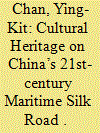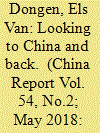| Srl | Item |
| 1 |
ID:
159340


|
|
|
|
|
| Summary/Abstract |
This article suggests that Chinese scholars in Guangdong, through historical work endorsed or sponsored by their government, justify the inclusion of Southeast Asian nations in the 21st-century Maritime Silk Road (MSR) initiative. In doing so, they seek to add the MSR to the United Nations Educational, Scientific and Cultural Organization’s (UNESCO) World Heritage List. By exploring how historians and officials adhere to the expectations of the Chinese state and UNESCO in highlighting Guangdong’s role in the 21st-century MSR initiative, the article examines the production of cultural heritage at the local level in contemporary China.
|
|
|
|
|
|
|
|
|
|
|
|
|
|
|
|
| 2 |
ID:
159341


|
|
|
|
|
| Summary/Abstract |
This article examines the impact of foreign-invested enterprises in the development of China’s automotive industry. It particularly focuses on the case of foreign direct investment (FDI) by a Korean firm, namely, the Hyundai Motor Company, in China. The Chinese government’s policy regarding the automotive industry allowed China’s domestic manufacturers to benefit from technology transfer, as foreign firms were not allowed to invest exclusively in China without a partnership. The contribution of Korea’s investment in China’s automotive industry would comprise the creation of job opportunities, technology transfer and the development of the automobile parts industry. Korea’s investment in the automotive industry of China has policy implications for China and other developing countries trying to expand their technology-intensive industries.
|
|
|
|
|
|
|
|
|
|
|
|
|
|
|
|
| 3 |
ID:
159344


|
|
|
|
|
| Summary/Abstract |
Against the background of the rise of ‘diaspora institutions’ since the early 2000s, this commentary reflects on China’s diaspora engagement and India’s interest in it in the context of its own institutionalisation of diaspora engagement since the early 2000s. It argues that notwithstanding historical and political differences, some lessons could be learned from China. These pertain to the importance of recognising the various segments of the diaspora; the role of community organisations; the centrality of diaspora research; and the connection between diaspora policies and shifting national priorities. However, both in China and in India, some principal limits remain in terms of diaspora engagement due to the prioritising of the socio-economically advantaged; the tension among cultural, ethnic and territorial understandings of the nation; and because political inclusion lags behind the focus on economic and knowledge contributions. These limits lead us to reconsider some of the shared ideas, assumptions and practices behind the rise of ‘diaspora institutions’ in a broader sense.
|
|
|
|
|
|
|
|
|
|
|
|
|
|
|
|
| 4 |
ID:
159342


|
|
|
|
|
| Summary/Abstract |
The critical role played by agriculture in the modernisation of Japan, well-highlighted in the literature, is held to be a model worthy of emulation by latecomers. What this meant for the poor or the tenant farmer is something that does not get much attention. This article looks at the writings of a poor owner-tenant farmer, Teisuke Shibuya, who maintained a diary in the years 1925–6 in which he had graphically recorded the conditions in agriculture and the kind of life the peasant led. We also utilise a book Shibuya published 60 years after he started maintaining the notes which led to the publication of the diary. Shibuya, who actively struggled to raise peasant consciousness, was articulate and extremely well read, and could hold his own in debate with urban intellectuals. His writings are valuable as they convey the actual life of the peasantry during Japan’s modernisation drive. In Shibuya’s jottings, the emotions and feelings of the peasant who was exploited by the authoritarian state and the landlord system come through, presenting us with a picture that is vastly different from the standard academic writings on the subject, thus cautioning us when we uncritically attempt to learn lessons from the Japanese modernisation experience.
|
|
|
|
|
|
|
|
|
|
|
|
|
|
|
|
| 5 |
ID:
159343


|
|
|
|
|
| Summary/Abstract |
China’s return to hard-power strategies in Asia represents more than a geopolitical sea change. It is not just Xi Jinping rejecting Deng Xiaoping’s soft-power foreign policy, but the whole ethos of Dengism as the West has sorely misunderstood it. A generation of Western observers has taken this putative Dengism as the abiding essence of the China model. Its ‘win/win’ blueprint for China’s rise became a central pillar of ‘Washington Consensus’ globalism, which is now giving way to the Sino-globalism of Xi’s ‘China Dream’. There is still talk of the ‘peaceful rise’, but Xi conditions his vision of Asian ‘harmony’ on the acceptance of China’s regional supremacy. To comprehend the full implications of this hard-power shift is to recognise that the era of irenic globalism has ended and a new age of power politics has dawned.
|
|
|
|
|
|
|
|
|
|
|
|
|
|
|
|